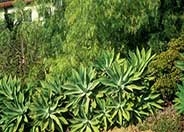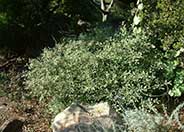
Common name:Fox Tail Agave, Velvet Agave
Botanical name:Agave attenuata
This Agave has a dramatic tropical form. Even light frost can damage its succulent leaves. It is great for containers. In the low desert, partial sun will be best. If it becomes top heavy, simply cut and stick in the ground to root. It is not a fast grower and has light green foliage. It will also die after flowering but pups around the mother will survive. Distinctive with its large rosette of leaves perched on a long curving trunk, it is a native from Mexico.

Common name:California Coffeeberry
Botanical name:Rhamnus californica
The California coffeeberry is an evergreen shrub that reaches 6'-8' high. It grows inland and has large green to black berries in late summer. This shrub tolerates sun or partial shade in all soil types. The California coffeeberry is a native to California and is drought tolerant. It is a beneficial insect plant and attracts butterflies. -Cornflower Farms

Common name:Carmel Creeper
Botanical name:Ceanothus griseus horizontalis
Carmel Creeper is one of the most popular forms of spreading shrubs. Its glossy oval leaves of 2" are bright green. The tiny, light blue flowers are abundant and form 1" clusters. This shrub benefits from pruning. It does best in well-drained soil with little to no summer water.

Common name:Olive
Botanical name:Olea europaea
This broad tree will grow to 40' tall and has small, gray green leaves with fleshy black fruit that appears in fall.

Common name:Italian Cypress
Botanical name:Cupressus sempervirens 'Stricta'
Italian Cypress is often associated with Italian and Spanish architecture, providing columns in the landscape. They often reach 60' tall. 'Stricta' is compact, columnar and produces long, straight branches with deep green foliage.

Common name:Yellow Moraea, Fortnight Lily
Botanical name:Dietes bicolor
This clumping perennial Iris relative stands 3'-4' high. It has light yellow, iris-like flowers with maroon blotches that are about 2" wide. It performs best in full sun and in soil with good drainage.
Compost for Healthy Soil and Plants
The natural world works in cycles. Everything is changing form and moving from place to place in an endless energy exchange system. The leaves and twigs that fall to the ground, not to mention other life forms that might die, decompose and combine with water, air and minerals of the soil to create a medium for future plants.
Click in the green box for more information
| Designer: | Spanish Villa Front Yard |
Photographer: GardenSoft |
Soils and Compost:
Practice grass-cycling by leaving short grass clippings on lawns after mowing, so that nutrients and organic matter are returned to the soil.
Water Saving Tip:
Adjust sprinklers to avoid watering sidewalks and driveways.
Integrated Pest Management:
Attract, or buy beneficial insects such as ladybugs and lacewings to control pest outbreaks in your garden.

